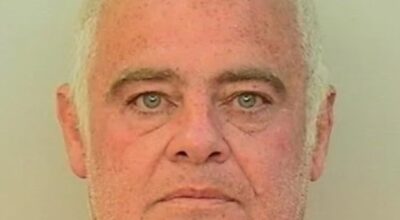Sentence in 2018 kidnapping will stand, appeals court rules
Published 4:01 pm Monday, March 13, 2023

- R.J. Bartie was sentenced to 80 years in prison for a 2018 kidnapping. (Special to the American Press)
The sentence for a Lake Charles man convicted in the 2018 kidnapping of a local woman has been affirmed by the 3rd Circuit Court of Appeal.
Judge David Ritchie sentenced R.J. Bartie in January to 30 years on one count of home invasion, 30 years on one count of second-degree kidnapping and 20 years on one count of attempted second-degree kidnapping. The sentences are to run concurrently and are all without benefit of probation, parole or suspension of sentence.
Bartie was accused of approaching a family of three — while armed — on Sept. 6, 2018, as they sat on their backyard porch. When Bartie walked toward the backyard, the daughter fled inside and Bartie proceeded to chase her. The victim’s mother testified that when she followed them into the home “Bartie had (the woman) up against the refrigerator and her feet were dangling and he had the gun to her head.”
The mother testified that Bartie struck her and knocked her to the floor as he dragged her daughter to his vehicle. After Bartie placed the daughter into the passenger seat, the woman’s father approached him armed with his own firearm and told him to let his daughter go or he would shoot, the mother said.
As that confrontation ensued, the mother said she opened the passenger door and told her daughter to run. The daughter ran back inside, but Bartie chased her, grabbed her, and dragged her to his vehicle again, in the process knocking her parents down.
The father again told Bartie if he did not let his daughter go, he would shoot. As Bartie proceeded to the driver’s side to get inside the vehicle, the father shot him in the back.
Private security footage from the family’s home recorded the encounter.
Det. Ben Randolph questioned Bartie at the hospital that night and later testified — in his experience as being certified in field sobriety testing — he did not believe Bartie was was under the influence of drugs or alcohol that night.
In his appeal to the 3rd Circuit, Bartie claimed the trial court erred in denying him the chance to present evidence that he suffers from PTSD; erred in allowing the prosecution to present a page from his journal; erred in refusing to give the jury special instruction related to compromise verdicts; and imposed “unconstitutionally excessive” sentences.
The appeals court judges ruled that when Bartie was tried upon a plea of not guilty, evidence of insanity or mental defect at that time of the offense shall not be admissible. The court also said Bartie had seven months to change his plea before the start of his trial. “Bartie never filed a motion to change his plea, with counsel going so far as to state in open court that ‘I’m not changing my plea,’ ” the judges wrote.
The judges also ruled the issue of whether the prosecution could introduce only a portion of a page from Bartie’s journal was already addressed during the emergency writ application filed by Bartie during trial. “Given Bartie’s failure to present anything new beyond the fact that he proffered testimony into the record, the law of the case doctrine applies and this court’s prior ruling stands,” the panel wrote.
The judges also dismissed Bartie’s claim that the jury should have been instructed that even even if the prosecution proved every element of the offenses charged, the jury could simply choose to convict him of a lesser included offense. The panel found Bartie was not entitled to have that instruction given to the jury.
Of Bartie’s claims that he shouldn’t have been ordered to serve maximum sentences, the panel wrote he “technically” isn’t. “Barit received maximum sentences for home invasion and attempted second-degree kidnapping while his 30-year sentence without benefits for second-degree kidnapping represents 75 percent of the maximum. All of his sentences are to run concurrently, meaning the only sentence he is actually serving is his sentence for second-degree kidnapping.”





